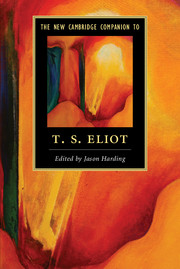Book contents
- Frontmatter
- Contents
- Notes on contributors
- Preface
- Chronology of Eliot's life and works
- List of abbreviations
- 1 Unravelling Eliot
- 2 Eliot: Form and Allusion
- 3 Prufrock and Other Observations
- 4 Banishing the Backward Devils: Eliot's Quatrain Poems and “Gerontion”
- 5 With Automatic Hand: The Waste Land
- 6 “Let These Words Answer”: Ash-Wednesday and the Ariel Poems
- 7 Four Quartets
- 8 “A Precise Way of Thinking and Feeling”: Eliot and Verse Drama 116
- 9 T. S. Eliot as Literary Critic
- 10 T. S. Eliot's Social Criticism
- 11 Gender and Sexuality
- 12 Eliot's Philosophical Studies: Bergson, Frazer, Bradley
- 13 “Anglo-Catholic in Religion”: T. S. Eliot and Christianity
- Select bibliography
- Index
- Miscellaneous Endmatter
1 - Unravelling Eliot
Published online by Cambridge University Press: 01 December 2016
- Frontmatter
- Contents
- Notes on contributors
- Preface
- Chronology of Eliot's life and works
- List of abbreviations
- 1 Unravelling Eliot
- 2 Eliot: Form and Allusion
- 3 Prufrock and Other Observations
- 4 Banishing the Backward Devils: Eliot's Quatrain Poems and “Gerontion”
- 5 With Automatic Hand: The Waste Land
- 6 “Let These Words Answer”: Ash-Wednesday and the Ariel Poems
- 7 Four Quartets
- 8 “A Precise Way of Thinking and Feeling”: Eliot and Verse Drama 116
- 9 T. S. Eliot as Literary Critic
- 10 T. S. Eliot's Social Criticism
- 11 Gender and Sexuality
- 12 Eliot's Philosophical Studies: Bergson, Frazer, Bradley
- 13 “Anglo-Catholic in Religion”: T. S. Eliot and Christianity
- Select bibliography
- Index
- Miscellaneous Endmatter
Summary
There is a kind of fun in unravelling the twists & obliquities of this remarkable man.
Virginia Woolf, diary entry on T. S. Eliot, 14 September 1925.In 1927, T. S. Eliot told the Shakespeare Association: “About anyone so great as Shakespeare, it is probable that we can never be right; and if we can never be right, it is better that we should from time to time change our way of being wrong” (CP3 245). In this lecture, Eliot wittily disposes of several “up-to-date” Shakespeares proposed by contemporary critics. His gesture reveals an awareness of the difficulties of addressing a scholarly audience on the subject of the most studied author in the English language. Eliot's approach to the canon was often marked by iconoclasm: Hamlet was judged “most certainly an artistic failure”; Milton “writes English like a dead language”; Shelley was “humourless, pedantic, self-centred”; Tennyson's poetry is condescendingly placed as “beautiful but dull.” These extravagant judgements are indicative of an anxiety about the potentially numbing dead weight of canonical reputations. For today's readers of Eliot, seeking fresh interpretations of his work, the challenge that “we should from time to time change our minds” (CP3 245) is no less daunting than the position that confronted Eliot when he addressed the Shakespeare Association.
The relationship of an author's life to his work is crucial in reassessing Eliot's achievement as a poet, critic and dramatist but can require a certain amount of careful unravelling or untangling of the received opinions that have shaped his reputation. In “Tradition and the Individual Talent” (1919), Eliot famously claims “the more perfect the artist, the more completely separate in him will be the man who suffers and the mind which creates.” He advances an “Impersonal theory of poetry” (CP2 109, 108). However, many critics have ignored Eliot's own separation of poet and poems. Ezra Pound contended that Eliot “arrived at the supreme Eminence among English critics largely through disguising himself as a corpse.” Pound felt that Possum's pontifical authority camouflaged the avant-garde affront to conventional taste represented by The Waste Land. By contrast, Helen Gardner's The Art of T. S. Eliot (1949), a book which Eliot recommended as the best study of his poetry, placed the emphasis on Four Quartets, characterized as the work of a devout Anglican.
- Type
- Chapter
- Information
- The New Cambridge Companion to T. S. Eliot , pp. 1 - 25Publisher: Cambridge University PressPrint publication year: 2016



